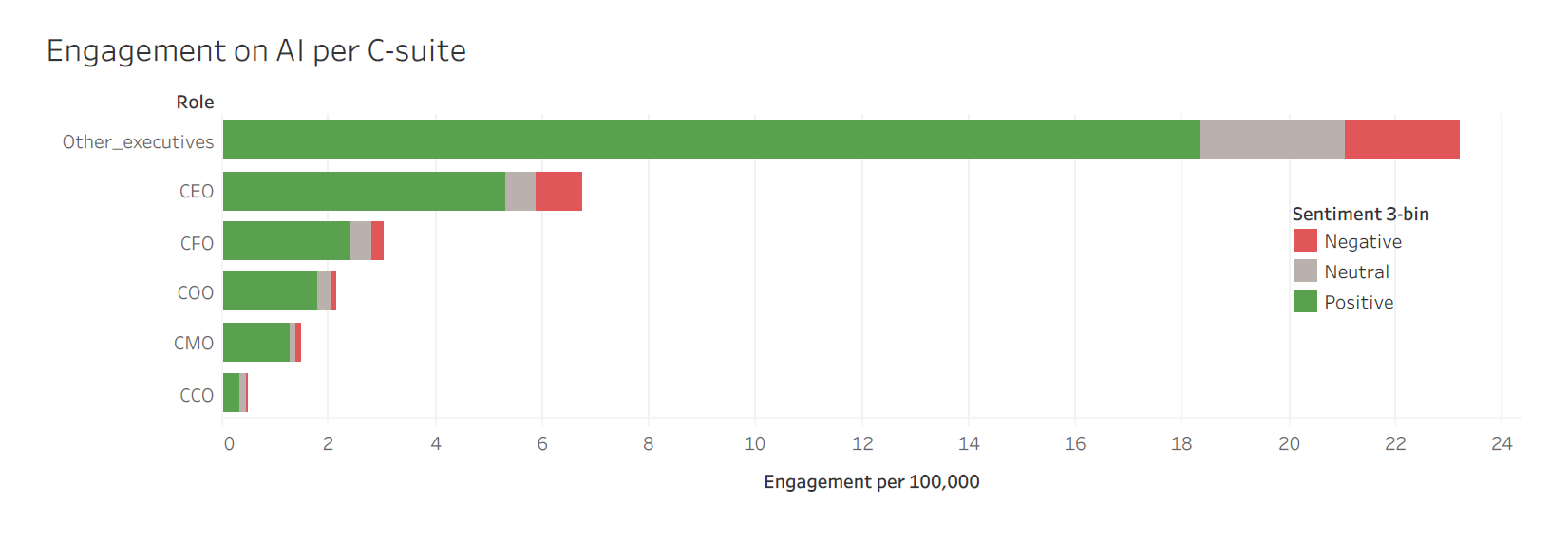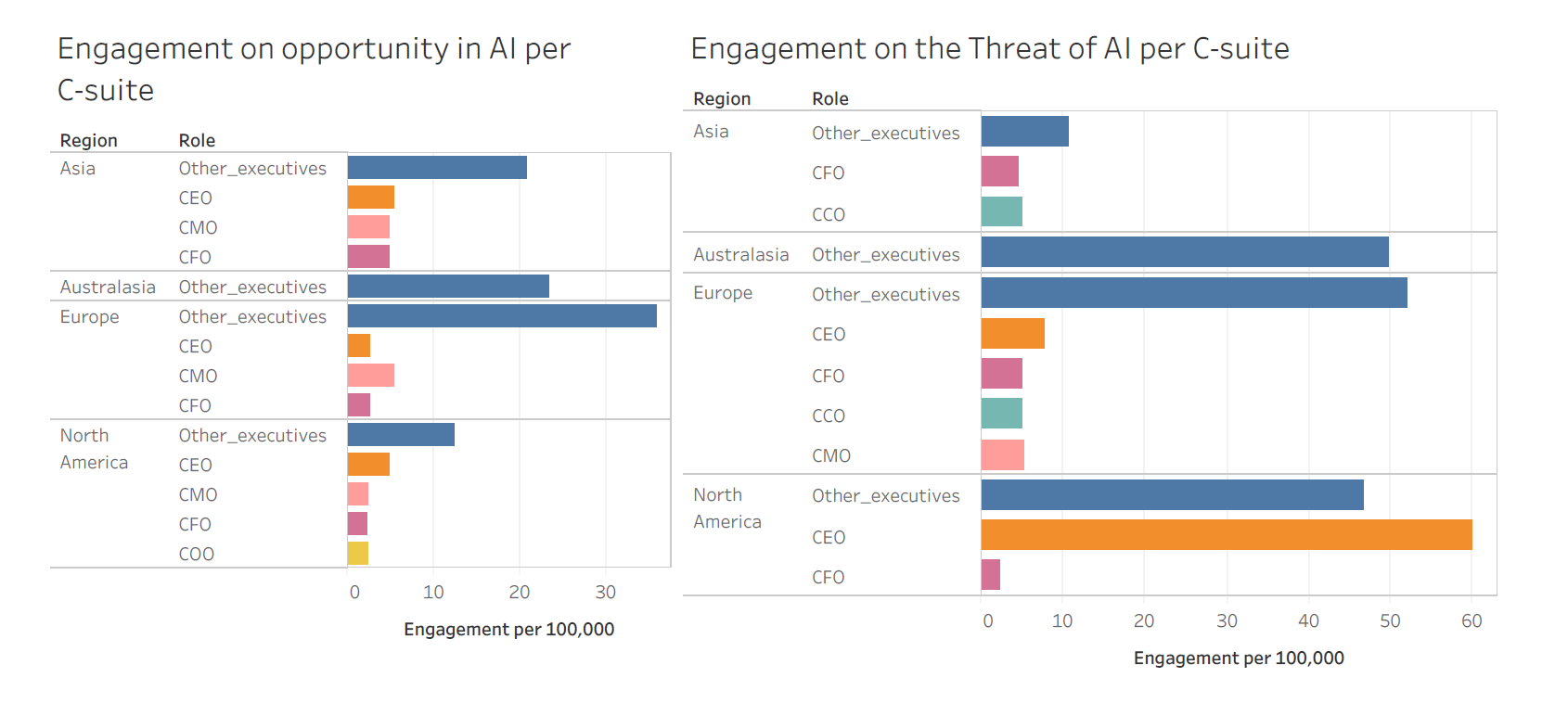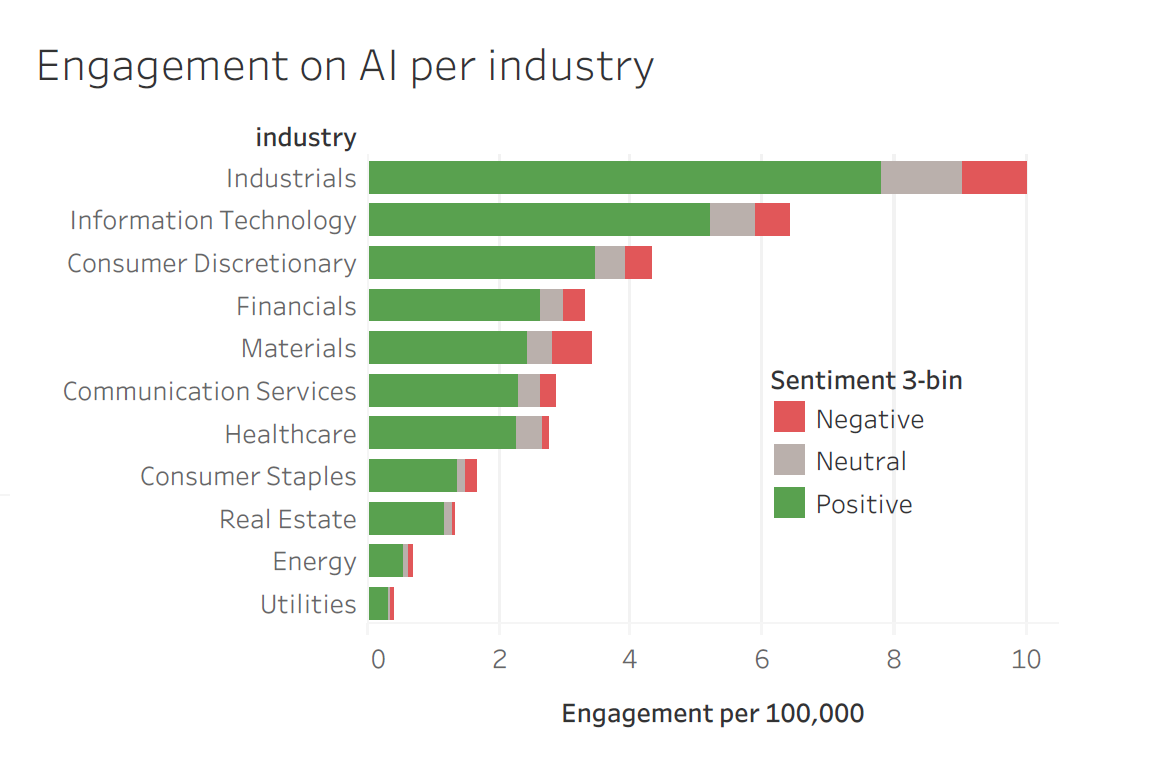“Supermarket AI meal planner app suggests recipe that would create chlorine gas” and “A tsunami of AI misinformation will shape next year’s knife-edge elections” are just two of the hundreds of headlines warning about the dangers of AI. But other headlines tell a more positive story like “AI: Stroke patient helped to walk by high-tech trousers” and “New artificial intelligence tool can accurately identify cancer”. With so much attention in the media, it’s perhaps not surprising that Artificial Intelligence is number four for the topics CEOs are most engaged with according to this month’s Worldcom Confidence Index (WCI) Engagement Monitor which tracks what over 100,000 C Suite executives globally are saying on social media.
As this community is representative of the people who will be making decisions on how to use Artificial Intelligence (AI) or protect their organization from it, we’ve picked out four key themes from the latest data and shared some communications implications.
4 Communications implications from our WCI analysis
Based on the data we suggest that communications professionals consider the following:
- Taking a position as an organization to fight polarization and create a stronger sense of community locally and globally.
- Having a section in your communications and brand strategy specifically relating to AI. This should address the organization’s stance on the ethics of AI and how AI can be used to deliver the organizations Purpose.
- Including AI in regular risk assessment as part the organization’s crisis policy and procedures – particularly for the brand impact of AI-enhance cybercrime and the deep fakes.
- How to use AI constructively in communications and marketing and upskill employees to provide the creative thinking needed to use AI to advantage.
Main themes
1.CEOs are much more engaged on the topic of AI than other C-Suite execs – and over four times more than CMOs.
2. The threat of AI is attracting more attention than the opportunity of AI. 12 times as many CEOs in North America engaged with the threats of AI than the opportunities.
3. The three most engaged sectors are Industrials, IT and consumer discretionary. Ten times as many leaders in the Industrials sector are engaged with AI than their peers in Utilities.
4. The C-Suite community is having conversations about AI and its implications on not just business but society as a Our qualitative analysis of conversations identified the following major themes about AI as an opportunity and a threat.
AI as a Threat
Within the CEO/CFO population, there is a healthy level of respect for the change that AI brings to the world and how that change poses a threat.
Among the types of threats, the population speaks of, are:
- The polarization threat to culture and society. The C-Suite seems to be acutely aware of the threat AI poses to the “aspects that make us human”. They are concerned that AI could have a negative effect on the social fabric of There is a consensus that the world is already quite divided, polarized and inconsiderate of alternative viewpoints, therefore an AI that skews towards that tendency is not ideal.
- The ethical considerations relating to uncontrolled development. The C-Suite is calling for a standardized assessment of the ethics of AI. They believe “fail fast and move on” does not apply to AI given its immense They call for experts in the field to create a systematic way of evaluating the ethics not only of AI algorithms but of their use. They are critical of policymakers and regulators handling AI. They do not believe policymakers are well equipped to properly govern the AI revolution. They see this as a threat both in policymakers missing the nuances of AI and conversely for the evangelist policymakers broadly denouncing AI that could be beneficial for society. This population believes policymakers and regulators have a responsibility to do better for the greater good.
- The threat of being left behind. The C-Suite sees a need for a country level strategy for AI to avoid losing the technological race and to ensure protection against AI crime and deep fakes.
AI as an Opportunity
The C-Suite also sees AI as an opportunity.
- The augmentation of capabilities. This could be small things like an AI-powered knowledge management system or simplifying more complex tasks like AI in No code tools.
- Lowering of barriers to innovation. In terms of the business application of AI, the WCI C-Suite population mentioned the following areas:
- Content marketing. They believe AI technology could help with the writing and conceptualization of marketing companies and the smarter segmentation of target audiences.
- Employee onboarding and upskilling. They mention the benefits AI could bring to supporting HR by optimizing a tailored onboarding experience for employees. They also raise how AI could enhance team productivity by suggesting upskilling opportunities for employees.
- Hyper Automation. The C-Suite sees the possibility of using AI to not only improve existing workflows but design new ways to transform workflows.
- Health care imaging
- Web 3 and Fintech
- AI artists
- AI influencers
- Interactive voice response systems
- Sports.
See the advice on the use of AI in PR and Communications from our Worldcom Public Relations Group Partners:
The future of AI in healthcare
By Phillips Group, Australia
AI is transforming healthcare, promising annual savings of $150 billion by 2026. Investments in AI are soaring as governments and businesses recognize its potential in clinical research, drug development, insurance, and medical processes. Four key areas of impact include diagnosis and treatment planning, predictive modeling, population health management, and non-clinical workstreams such as HR and finance. However, ethical concerns regarding data privacy and AI bias must be addressed to ensure the responsible and equitable implementation of AI in healthcare. Diverse, high-quality data and robust privacy safeguards are crucial in harnessing AI’s potential while mitigating risks.
Read the full article: The future of AI in healthcare
From Magic to Morals: Ethical Considerations for AI in Communications
By Padilla, Minneapolis, New York, San Francisco, United States
The State of AI in PR report by Muck Rack reveals that 61% of communications professionals are either using or considering AI in their work. While AI offers tremendous potential, it’s crucial to uphold ethical standards. Protecting privacy and data security is paramount, as AI tools may inadvertently share sensitive information. Verification and fact-checking are vital to prevent misinformation, as AI can generate inaccurate content. Bias mitigation is essential, with a focus on inclusivity and diverse perspectives. Continuous monitoring and adaptation of ethical guidelines are necessary in the ever-evolving AI landscape. Ultimately, communication professionals must be responsible gatekeepers, ensuring AI is used ethically and transparently to shape the future of the industry.
Read the full article: From Magic to Morals: Ethical Considerations for AI in Communications | Padilla (padillaco.com)
How To Influence The AI Debate and Regulation in Washington
By Raffetto Herman Strategic Communications, Washington, DC, United States
As the 2024 elections approach in Washington, D.C., the debate over AI regulation is intensifying. AI has far-reaching implications for society, from labor concerns to data privacy and ethical debates. Organizations can influence this debate by engaging policymakers, monitoring legislation, issuing public statements, and building coalitions. Subject matter experts are crucial in helping policymakers make informed decisions about AI’s future impact. It’s an opportunity to shape the regulatory roadmap for AI while maximizing its benefits and minimizing potential harm.
Read the full article: How To Influence The AI Debate and Regulation in Washington
3 Ways machine learning is improving real-time marketing
By Phillips Group, Australia
Machine learning plays a pivotal role in enhancing real-time marketing by leveraging data and algorithms to mimic human learning. It offers three key benefits: First, it provides relevant audience insights and segmentation by analyzing customer data, allowing marketers to pinpoint optimal engagement points and content preferences. Second, it enables increased personalization, tailoring content to individual preferences and boosting brand affinity. Finally, it helps reduce churn rates and improve post-purchase experiences by identifying potential customer behavior shifts and intervening with personalized content or notifications. As consumers grow more selective, machine learning is vital in rebuilding trust and delivering effective real-time marketing strategies.
Read the full article: 3 Ways machine learning is improving real-time marketing
The Pros and Cons of AI Presentation Coaching Apps
By Padilla, Minneapolis, New York, San Francisco, United States
The article discusses the role of AI in coaching and improving communication skills, particularly in presentations. It explores AI-enabled coaching apps that provide real-time feedback on presentation skills, comparing them to human coaches. The advantages of AI coaching include accessibility, cost-effectiveness, and privacy. However, it also highlights limitations such as objectivity and bias. While AI and human coaches can complement each other, AI apps can help beginners learn foundational skills and human coaches providing personalized guidance for advanced development. Overall, AI-augmented coaching is seen as a valuable approach for enhancing presentation skills.
Read the full article: The Pros and Cons of AI Presentation Coaching Apps | Padilla (padillaco.com)
Generative AI: Chances, challenges, and changes for content marketing
By Phillips Group, Australia
Generative artificial intelligence (AI) offers significant opportunities for content marketing, such as creating high-quality content at scale and improving SEO. However, it comes with challenges, including accuracy, ethical concerns, biases, and intellectual property issues. Communication professionals need to carefully consider where and how to incorporate generative AI, ensure data accuracy, uphold legal and ethical standards, and stay updated with advancements. While generative AI has the potential to transform content marketing, it can’t entirely replace the personal touch and professional expertise. Quality, accuracy, context, integrity, and authenticity should always be prioritized.
Read the full article: Generative AI: Chances, challenges, and changes for content marketing
Leading The Convo on The Impact of Artificial Intelligence & Outlasting The AI Hype Cycle
-> GET THE GENERATIVE AI PR PLAYBOOK
By Shift – a division of Padilla, Boston, New York, San Francisco, United States
How To Do AI Startup & Tech PR, Featuring AI Survey Insights
By Shift – a division of Padilla, Boston, New York, San Francisco, United States
The article highlights the growing interest and hype around artificial intelligence (AI) and generative AI (genAI) and its impact on AI startups’ public relations (PR) efforts. With a surge in media coverage, AI startups face both opportunities and challenges in building awareness. A survey revealed a significant awareness gap among the general population despite AI companies gaining prominence within the tech industry. The article emphasizes the importance of effective PR strategies, storytelling, vertical education, trust-building, and financial communications for AI startups to establish themselves as industry leaders and attract customers, talent, and investors, particularly in the early-to-mid hype cycle.
Read the full article: How To Do PR for AI Startups & Technology Companies (shiftcomm.com)






